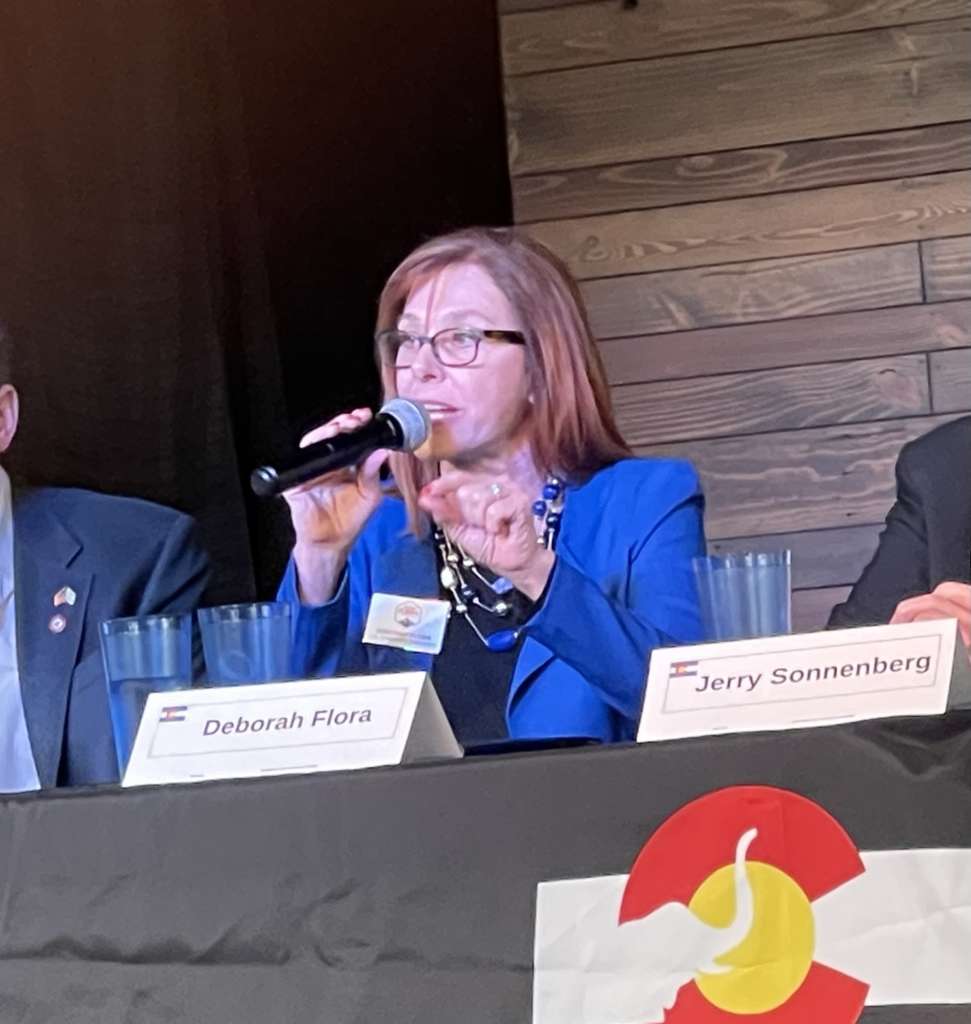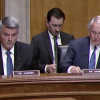On Saturday, the atmosphere at the Deep Space Parker Lounge and Event Center in Parker, Colorado, was notably subdued as the Colorado Young Republicans hosted a debate for GOP candidates running in Colorado’s 4th Congressional District (CD4), currently represented by retiring U.S. Congressman Ken Buck.
The six candidates present — U.S. Rep. Lauren Boebert (R-CO), former talk radio host Deborah Flora, former congressional staffer Chris Phelen, Hispanic Energy Alliance chair Floyd Trujillo, and former state lawmakers Ted Harvey and Jerry Sonnenberg — brought a sense of restraint that’s been a surprising feature of other forums featuring this year’s GOP candidates for CD4. Lead moderator Jimmy Sengenberger guided the discourse through a set of conservative topics.

As they addressed issues such as abortion, border control, the funding of the Department of Education, and election integrity, the candidates often echoed the positions of former President Donald Trump.
On abortion, Trump last month said he favors a ban after 16 weeks of pregnancy, with exceptions.
Harvey’s comments on abortion provided a jarring note, exemplifying the far-right’s extreme rhetoric: “Democrats are the radicals who want to kill 7-pound babies,” he declared, voicing his support for a national abortion ban, in part, to stop places like Douglas County from becoming unintended “abortion tourism” hotspots.
In contrast to all his opponents on the debate stage on Saturday, Phelen vocalized support for state sovereignty in lieu of a national abortion ban. Phelen embraced a more traditional conservative ethos advocating for limited federal reach.
Three other CD4 Republican candidates, state lawmaker Richard Holtorf, businessman Peter Yu, and Weld County Council member Trent Leisy, were absent on Saturday night, but in other forums they’ve all aligned with Phelen and oppose a national abortion ban. Another CD4 candidate, state Rep. Mike Lynch of Wellington, also absent Saturday, opposed a national abortion ban at one GOP debate but during a subsequent radio interview, he expressed support for such a ban.
A moment of discord arose during a debate over a rejected bipartisan border security bill, which included aid to Ukraine and Israel.
Phelen observed, “There are certain people, especially someone on this stage, who I think wouldn’t support the legislation.”
Boebert quickly countered, “I voted against it. You’re welcome too,” proudly asserting her opposition.
Phelen responded, “That’s great. You voted against a bill that would help close the border,” highlighting the internal divide over security strategies.
As the conversation shifted to education, all candidates united in their call to dismantle the Department of Education, reflecting longstanding right-wing attacks on the department. Harvey pushed for a voucher system, a reform that would dramatically change the public education structure by directing funds to private schools.

Flora spoke with pride about her actions in Douglas County, where she touted her significant role in “flipping the school board” and overturning what she viewed as problematic policies like Critical Race Theory (CRT).
Flora also claimed, “In my home school district of Cherry Creek, they’re transitioning children at the age of 12 without their parents’ knowledge or consent.”
This is in reference to a memo issued to educators in the Cherry Creek School District, which outlined the importance of respecting students’ requests to be called by names that align with their transgender or gender-fluid identities. The Cherry Creek Parent Advocacy Network (CCPAN) has used this memo to bolster its claims that the district has “gender transition plans.” The memo actually follows the advice of the U.S. Department of Education, which issued guidelines on how to support transgender students but has no reference to a plan to “transition” its students without parental consent. Rather, it speaks about supporting students’ requests for name or gender changes when being addressed by staff at school.
On the other end of the spectrum, Trujillo appeared to lack a definitive educational policy, echoing his fellow candidates with a simple “Ditto, ditto, ditto across the board.” His inability to articulate a unique stance on education — or any other topic — may explain his failure to capture any straw poll votes.
The discussion on election integrity revealed expected narratives of skepticism about voting systems. Here, both Sonnenberg and Trujillo echoed commonly heard conspiracies, suggesting a propensity for “fraud and cheating” when Democrats are involved in elections. However, both stopped short of providing evidence for such sweeping claims.
Standing in sharp contrast again was Phelen, who addressed the elephant in the room — the 2020 election. Phelen was the lone candidate to assert his belief in the election’s integrity, stating unequivocally: “I have faith in our legal system. If it was invalid, we would have found that.”
Flora took a more circumspect approach, avoiding direct allegations while emphasizing the need to “clean up our voter rolls” and secure future elections.
As the evening’s discussions came to a close, Sengenberger’s harmonica performance briefly energized the room, bringing a somewhat lively end to what had otherwise been a series of reserved exchanges among the candidates.
In the informal straw poll that followed, Flora emerged as the clear favorite with 37 votes, significantly outpacing Boebert’s 13 and Sonnenberg’s 10. Harvey collected 7 votes, Phelen 4, while Trujillo failed to secure any. Notably, Holtorf and Lynch, both absent from the debate, received one and zero votes, respectively, with one attendee remaining undecided.




